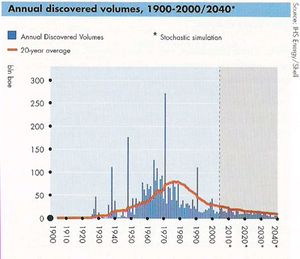Course:ECON371/UBCO20010WT1/GROUP3/Article2
Summary:
Royal Dutch Shell reconfirmed strong momentum in its businesses in the Americas, reporting that production in the region could reach 1 million barrels of oil equivalent per day (MMboe/d) in 2014, an increase of some 40% on current levels.
Shell has invested over $60 billion in development of new fields, new exploration leases, and acquisitions of undeveloped resources positions. Upstream Americas asset sales proceeds are expected to exceed $2 billion in 2010-11, part of Shell’s worldwide plans for $7-8 billion of disposals.
The outlook for deep water remains positive, despite the current drilling suspension in the Gulf of Mexico. Shell is moving ahead with a 100,000 barrels of oil equivalent per day (boe/d) tension leg platform in the Gulf called Mars B, which is part of the company’s post-2014 growth potential.
Exploration performance continues apace, with Gulf of Mexico drilling activities in 2009 and 2010 adding over 500 MMboe for the company, including the 2010 Appomattox discovery, which has total resources in excess of 250 million MMboe. These finds are part of a portfolio with more than 250,000 boe/d of production potential for Shell in the Gulf of Mexico. The exploration outlook is positive, with a substantial inventory of new prospects, including plans to drill in Alaska in 2011, the company says.
Economic Analysis
Shell is currently investing heavily in research and development in order to fund future projects. This article reports that these investment efforts have been working very strongly in Shell’s favour, possibly leading to an increase of as high as 40% over current oil production levels.
The major area of development that Shell has been focusing on has been the Gulf of Mexico, in which it has found over 500 million barrels of oil equivalent (MMBOE). This research has been ongoing mainly because of the recent, six month, moratorium on offshore oil drilling in the Gulf of Mexico which followed the Deepwater Horizon oil spill. This moratorium undoubtedly freed up much of Shell’s operating costs to be moved into the research and development aspect of the company.
Although I don’t have access to Shell’s corporate profits and revenues, it may be argued that the Gulf of Mexico oil spill is not so detrimental for offshore oil production in the region: after the discovery of these profitable oil deposits, Shell is expecting to invest a massive $10 billion per year into the region. Thus, because Shell is not paying the cleanup costs that BP is taking on, Shell will likely come out of this debacle ahead of at least one of its rivals and almost certainly in better shape than it came in.

Prof's Comments
It is certainly interesting how companies respond to the situations they face. This reflects something we did talk about in class, namely that people will change their behavior to minimize the impact a negative externality or something like that will have. In this case, it seems that Shell is taking the moratorium on drilling in American waters in the Gulf as an opportunity to undertake other investments.
Beyond this fact, is there anything else that you recognize here from class? How would you expect the fact that BP is on the hook for a large part of the cleanup cost to impact on Shell's behavior? Are companies likely to only do the minimum, or are the large penalties an incentive to be safer?